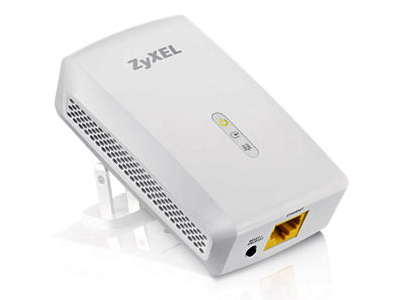ZyXEL Claims World's First With New Gigabit Powerline Adapter
Get Tom's Hardware's best news and in-depth reviews, straight to your inbox.
You are now subscribed
Your newsletter sign-up was successful
Up until now, we've seen powerline-based networks reach 500 Mbps speeds. This type of setup typically includes one adapter plugged into a network's router and an electrical outlet, with "receiver" adapters plugged into other electrical outlets throughout the home or office.
However, networking device supplier ZyXEL Communications announced on Tuesday that it's the first company to release a gigabit-speed powerline adapter, the PLA5206, which will be sold in pairs for $160. The company also plans to release a 1.2 Gbps MIMO powerline adapter, the PLA5405, at a later date.
So what's the difference? The PLA5206 works when each adapter is on the same power line. However, the PLA5405 adapter includes Line-Natural / Line-Ground MIMO smart-antenna technology, meaning the adapter can send networking data over different wires at the same time. According to the company, this method provides extended coverage and better throughput.
The adapters are based on the HomePlug AV2 standard, which supports gigabit powerline speeds. They also provide backwards compatibility to devices based on HomePlug AV and IEEE 1901.
As for the specs, the PLA5405 product page isn't online as of the writing of this article. However, the PLA5406 specs show a gigabit Ethernet port that can be used for connecting the router on one plug and wired devices on the other plugs such as a game console, HDTV, Blu-ray player and so on. Other features include 128-bit AES encryption, a power saving mode, a maximum range of 984 feet and more.
"ZyXEL continues to push the envelope, launching better, faster and simpler home networking solutions," said Steven Joe, executive vice president for channel business for Americas at ZyXEL. "Our new powerline adapters will offer consumers more choices in plug-n-play, gigabit home networking technology."
The PLA5206 is expected to hit authorized virtual and retail store shelves on September 1. The PL5205 won't arrive until sometime in October.
Get Tom's Hardware's best news and in-depth reviews, straight to your inbox.
Follow Kevin Parrish @exfileme. Follow us @tomshardware, on Facebook and on Google+.

Kevin Parrish has over a decade of experience as a writer, editor, and product tester. His work focused on computer hardware, networking equipment, smartphones, tablets, gaming consoles, and other internet-connected devices. His work has appeared in Tom's Hardware, Tom's Guide, Maximum PC, Digital Trends, Android Authority, How-To Geek, Lifewire, and others.
-
slapshot136 Didn't Belkin do this a while ago? link: http://www.amazon.com/Gigabit-Powerline-HD-Starter-Kit/dp/B002GHCZMGReply -
yay I know this is misleading, but actually no. The belkin has a gigabit network port but only manages 500mbps maximum transfer speeds.Reply
There are even offerings with 100mbps network ports on devices capable of 4 or 500 Mbps. They still get to say it will do 500mbps, but you will never actually reach that speed even in a perfect world. -
christinebcw This will be an interesting test-product for us. ZyXel has been an interesting thorn-in-the-side for bigger brands for a few decades. I remember their first 14.4 modems being superior to Hayes, and then everyone jumped on the clone-modem market. 19.2 was short-lived, and next was ?? 24.4 then 28.8? Was that the steps? The ZyXel 28.8s were pretty solid - a lot of BBSs were humming with 8 of those to a COM port card.Reply
I'll definitely be looking forward to the first WORKING gigabyte powerline. -
gggplaya I used 2 different types of wireless range extenders for a while, but they always had dropped connections, i always had to reset them a few times a week etc.... They were just problematic.(netgear and amped wireless)Reply
So in a last ditch effort i bought an actiontec 500mbps powerline adapter and it's been super great. I've only had to unplug and replug it back in maybe once every 2 months. The speed is a little better than the wireless range extenders. I can get about 40mbps sustained on the actiontec powerline adapters, and only about 10-15mpbs on the wireless extenders. THe wireless extenders were useless for playing HD videos on my TV from my NAS server, but the actiontec adapters can play 720p no problem, and play some 1080p video without an issue. It does hiccup on some 1080p videos depending on the compression format.
If these zyxels can improve the speed and give double the speed, i'll be happy. Everyone mostly uses wireless range extenders, but powerline adapters are far more reliable in my experience. -
christinebcw GGG, we've had some clients needing that "unplug - replug" situation, too, while others don't. We can't detect the Why's or Why-Not's but since we don't live in those places, we can't be certain what the true User Experience is. Did their house lose power in a flicker? And thus a Plug-Replug was necessary? We don't know.Reply
Do you have any sense of why that UnPlug-RePlug is necessary?
It could be as simple as a Gaussian Effect, too - just the standard electromagnetic build-up on the wiring itself. So UnPlug-RePlug might be a decent solution.
Just curious.
We've perceived a greater reliability with the 200s instead of the 500s, but that hasn't been studied. Just a 'sense'. -
smxcan TRENDnet announced theirs on June 5, 2014: http://www.trendnet.com/press/releases/view.asp?id=2746Reply
-
yay Christine with the ones I have at home (all tp-links) I have only ever had to replug after loss of power, and that is in a small house with old wiring. The previous place I was in was recently built but required a replug at least once a month.Reply
It seems really hit and miss, but over all I have no complaints compared to having to run cables in a house I don't own.
